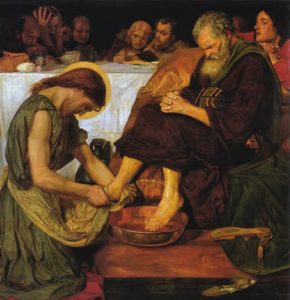Abba Father — Who Are You? (3)
Our Abba Father lives in ‘unapproachable light’ -- true. But Jesus also tells us “to have seen me is to have seen the Father” (John 14:9).
We know that Jesus uses parables to tell us about God and God’s ways. Does Jesus use a parable or an image that points readily to, and illuminates, his Abba Father? Specifically, do they tell us more about the “Father, Lord of heaven and of earth” (Matthew 11:25) who is also Master and Head of the divine household? Perhaps two images fit the bill: about being watchful and faithful in Luke 12:35-7 and 41-46. Pause to read them slowly.
A Grateful Master
The first passage sees the Christian life as faithfully waiting for the Master to return home from a banquet. Notice the wording: “ready to open the door as soon as he comes and knocks” (v 37). The Master of the house perhaps depends on the servants to ensure the security of the dwelling place. His trusts them. He does not have his own key. The Master depends on them to let him in.
The servants need to keep awake to enable the Master to get into his own home. Such readiness is, in itself, a form of welcome. When the Master is met with this faithful attentiveness, the response is totally unexpected: the grateful Householder puts on an apron and waits on his faithful servants at table. The roles are reversed: he will be a servant to his servants.
We see this gesture of the Father revealed in Jesus. The servant Jesus washes his disciples’ feet and calls them to do the same for each other (John 13: 2-11). Again, we find the ‘readiness’ to open the door in Revelation 3: 20-22. The Lord knocking at the door needs to have the door opened from the inside. In the famous Holman Hunt painting, there is no key on the outside of the door. And, as with the household Master, the meal image is used. Here, it is of equals, of friends sharing a meal.
Both images blend companionship and service. They also assume a ready and welcoming heart. Importantly, we gain an insight into how our Abba Father simply wants to offer lavish hospitality and gratitude to all humanity. As Brendan Byrne says, “Jesus is the agent and servant of that hospitality” (116).
Collaborative Leadership
Let’s consider the later verses (Luke 12:41-46), which offer some clues about a divine model of good leadership and style of management.
We see an arrangement in which the Householder delegates responsibility (and power) to a servant. It is a gesture of trust. The second half of the story concerns a trusted manager who becomes unfaithful by abusing his authority. Instead of acting for the benefit of the ‘workers’ -- men and women -- by providing food and basic care, he resorts to violence, aggravated, no doubt, by carousing and alcohol. When the Master gets back, the unfaithful steward will get exactly what he deserves. He is ‘cut off’ -- sacked from his job and ejected from the household.
 But it is the contrast that is enlightening for us.
But it is the contrast that is enlightening for us.
The faithful manager gives those under his care adequate food and fair treatment. When the Master returns home, he will place that servant “over everything he owns”. Not only is the Master willing to trust and share power in his absence. He goes further with those who have demonstrated their loyalty. They have what it takes. So, he delegates to them permanent responsibility for all his property, slaves and employees. It is the expression of effective management and collaborative leadership.
We see here another face of the Creator God who wants his human image to have stewardship over creation (Genesis1:26). “The Lord of heaven and earth”, our Abba Father, does not cling to power, but wants to share it.
The Master of the household images put more flesh on that idea. For God, we are worthy of trust and meant to be collaborators in the divine plan.
We are called to share in divine providence through making wise judgements. We see this in Jesus who, in his ministry, did not try to go it ‘alone’: he had companions and co-workers.
These two images of the Master of the Household offer a sharper picture of our Abba Father – one who trusts us, desires friendship with us, is grateful, wants to share his love, his power and his wisdom.
They continue the theme of the talents and how they are used. Praise, acknowledgement and the promise of happiness are, again, associated with sharing in divine providence, being collaborators with God.
“Well done good and faithful servant; you have shown you can be faithful in small things. I will trust you with greater; come and join in your master’s happiness”.
(Matthew 25: 23)
Brendan Byrne,
The Hospitality of God
(NSW: St Pauls, 2016)



 Entries(RSS)
Entries(RSS)